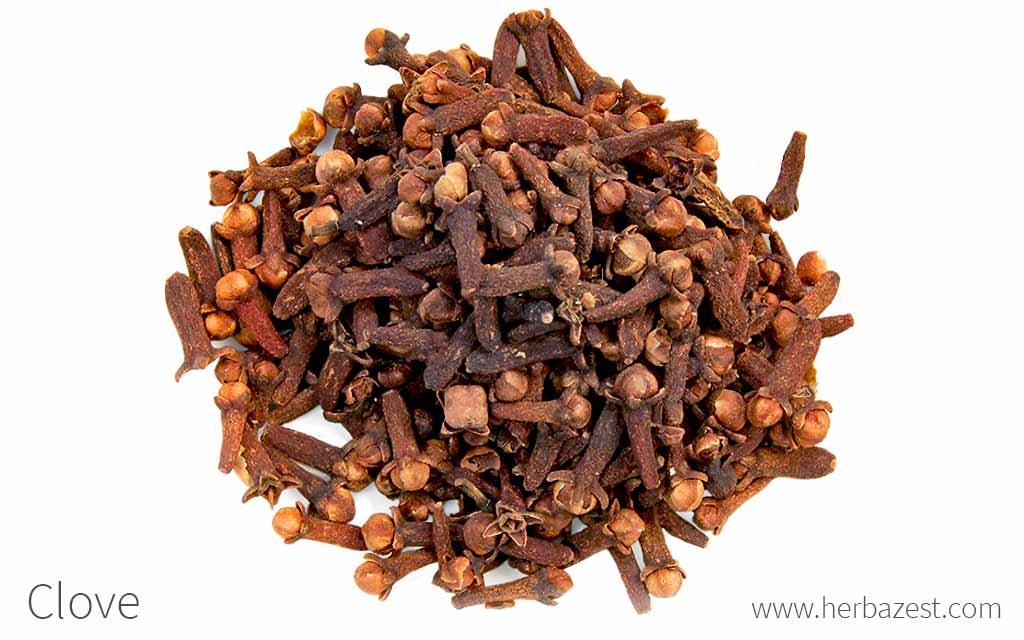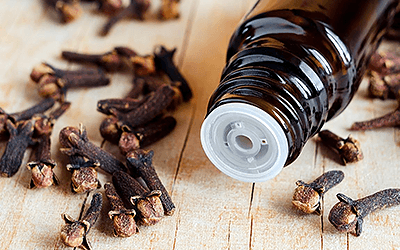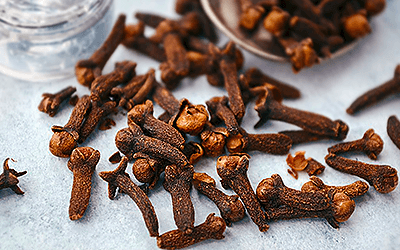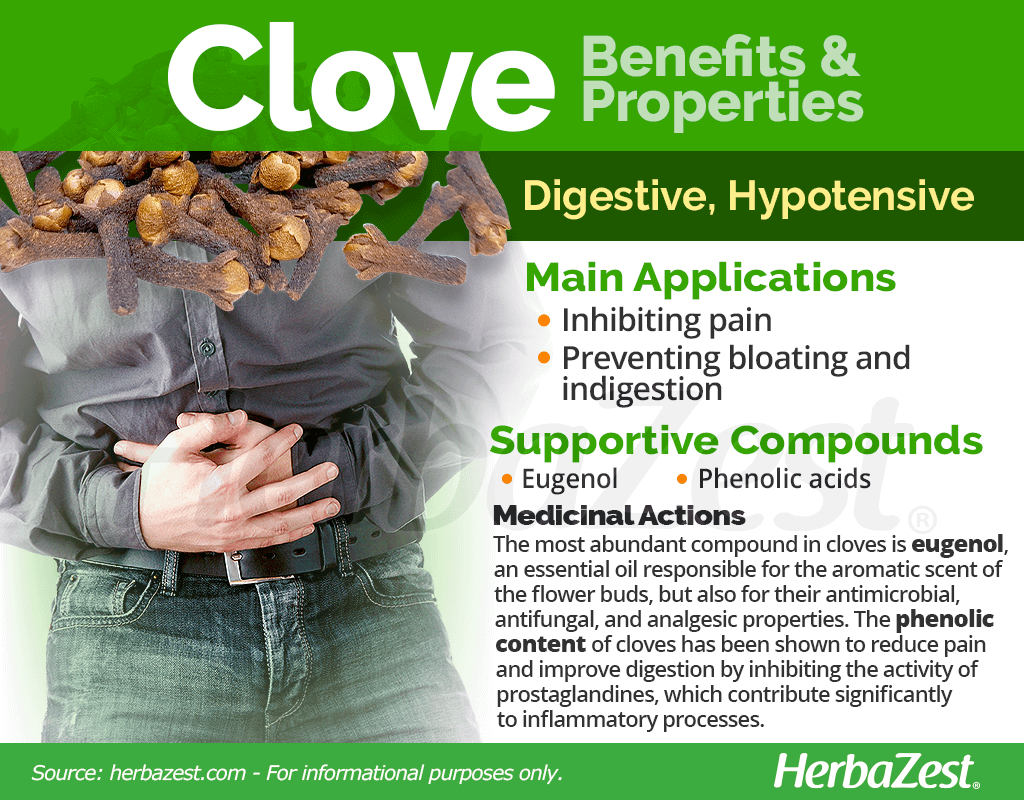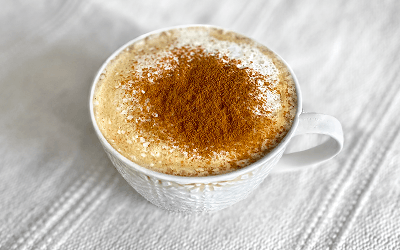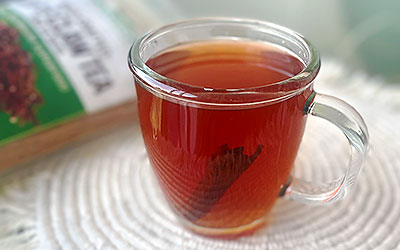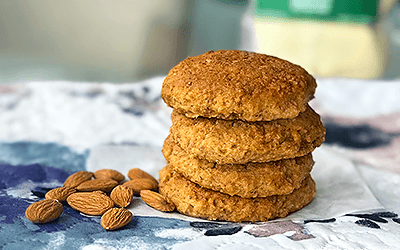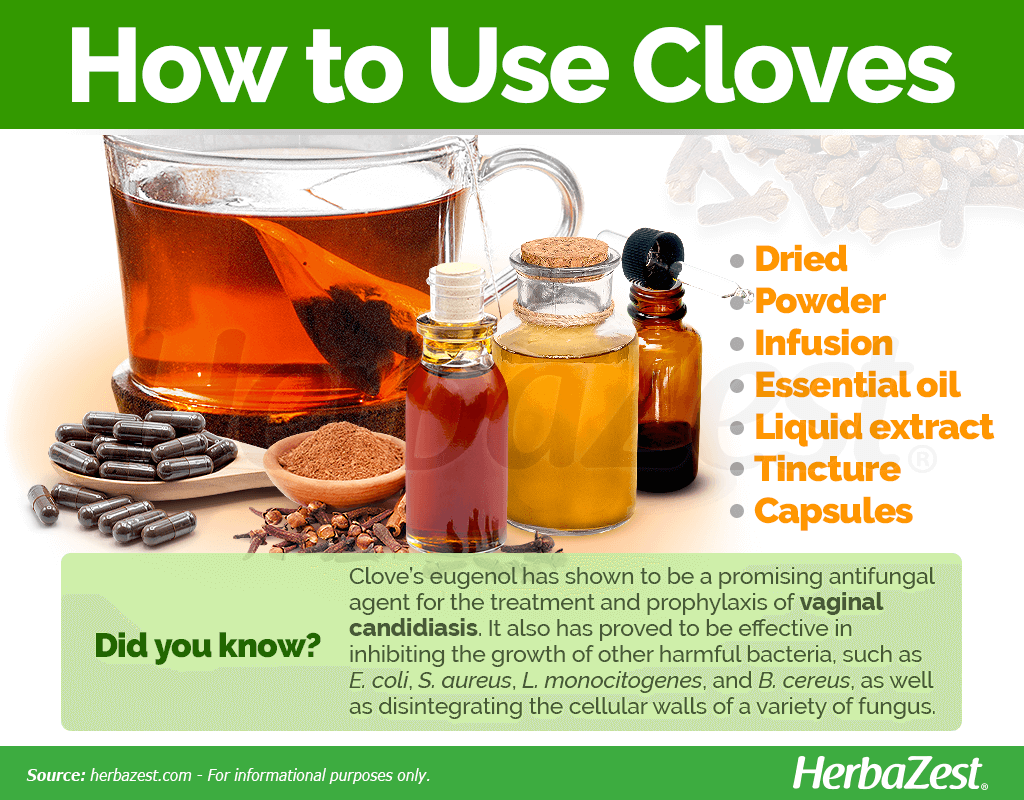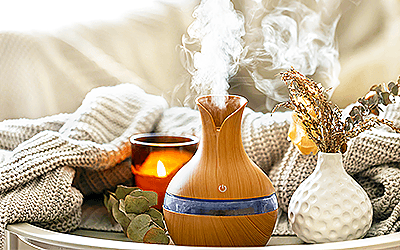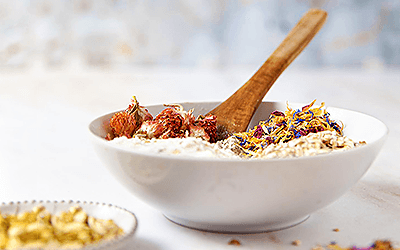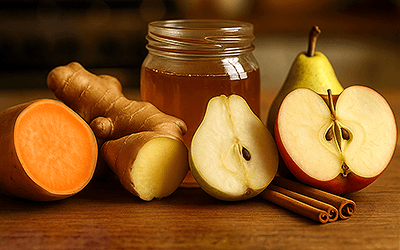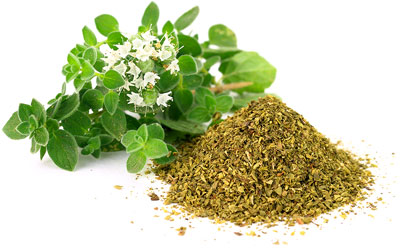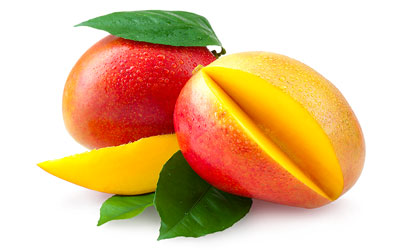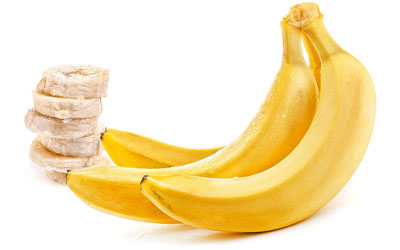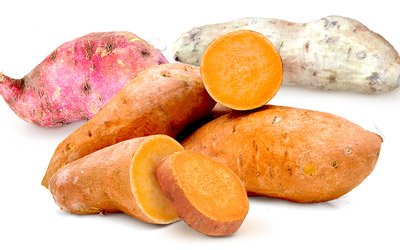The clove tree is thought to have originated in the Moluccas Islands (Indonesia) and introduced into China about 2000 years ago, where its flower buds quickly gained a reputation for their aromatic scent and their health benefits. Not only have cloves become a favorite seasoning in diverse cuisines throughout the world, but modern science has also revealed the impressive medicinal properties of this popular spice and corroborated many of its traditional uses.
Clove Medicinal Properties
- Medicinal action Analgesic, Digestive
- Key constituents Eugenol
- Ways to use Capsules, Hot infusions/tisanes, Liquid extracts, Tincture, Powder, Essential oil, Dried
- Medicinal rating (2) Minorly useful plant
- Safety ranking Safe
Health Benefits of Cloves
Cloves have been traditionally used in Chinese medicine for treating a variety of health conditions and scientific research has validated many health benefits of clove, mainly:
Inhibiting pain. Often used as a general anesthetic, clove oil is applied topically to relieve toothache, and cloves infusions help reduce the joint pain caused by osteoarthritis.
Preventing bloating and indigestion. The carminative analgesic properties of cloves extend when consumed and can help alleviate digestive pain.
Cloves have been shown to lower blood sugar levels in prediabetic people.1
Cloves have a history of use in the herbal medicine of Southeast Asia as a general cure-all, but they have also been used as a expectorant and a treatment for acne, bloating, and halitosis, as well as for eradicating intestinal worms and athlete's foot. Some consider the spice to improve memory and brain function, though insufficient evidence is available to support this claim.
How It Works
Cloves also contain high concentrations of Omega-3 fatty acids, dietary fiber, manganese, and vitamins C and K.
Cloves are among the most notable vegetable sources of phenolic acids, which are powerful antioxidants with a potential protective role against degenerative diseases, and have proven useful for the treatment of memory deficits caused by oxidative stress.2,3
The most abundant phenolic compound present in cloves' essential oil is eugenol, which is not only responsible for the aromatic scent of the flower buds, but it is also the main active ingredient behind their antimicrobial, antifungal, and analgesic properties.4
Clove's eugenol has been shown to inhibit the growth of harmful bacteria, such as E. coli, S. aureus, L. monocitogenes, and B. cereus, as well as to disintegrate the cellular walls of a variety of fungus.4,5
Eugenol has shown to be a promising antifungal agent for the treatment and prophylaxis of vaginal candidiasis.4
Other important phenolic substances present in cloves are gallid acid, as well as caffeic, ferulic, elagic, and salicylic acids. In lower concentrations, cloves also contain flavonoids, such as kaempferol and quercetin.
Whereas the cooking process generally decreases the antioxidant capacity of spices, the total phenolic content in cooked and digested cloves has been shown to inhibit the activity of prostaglandines, which are naturally occurring compounds that contribute significantly to the inflammatory processes in the human body, thus relieving pain and improving digestion.
Digestive and antimicrobial properties are also present in herbs like cardamom and cinnamon, whereas aspen, cayenne , and turmeric can provide similar analgesic benefits.
Cloves Side Effects
When consumed in normal dietary amounts, cloves are generally considered safe. Excessive oral consumption - such as in heavily-spiced dishes - may cause mild heartburn.
Clove oil may cause an allergic reaction, including hives, difficulty breathing, and swelling of the area of the mouth. Children, pregnant women, and those with bleeding disorders should avoid clove oil.
How to Consume Clove
- Edible parts Flowers
- Edible uses Flavoring, Condiment
- Taste Aromatic, Sweet
The most common use of cloves is as a culinary seasoning, adding a strong and flavorful aroma to many popular ethnic dishes. Asian, African, and Middle Eastern cuisines all make use of the spice in traditional cooking, where it is frequently combined with cinnamon, vanilla, or basil. However, in order to reap clove benefits it is better to consume it in medicinal preparations and supplemental forms.
Natural Forms
Dried. In this form, cloves not only give flavor to a variety of dishes, but also provide their carminative, digestive properties.
Powder. The dried cloves are finely ground to be used as a spice in culinary preparations, such as cereal, beverages, and baked goods.
Infusion. Drinking a warm tisane of cloves twice a day can help reduce the symptoms of osteoarthritis, such as pain and stiffness.
Herbal Remedies & Supplements
Essential oil. One to two drops of cloves' essential oil are usually enough to soothe away a toothache, while a 5% dilution can serve as a mouthwash. This is a very effective remedy for teething babies.
Liquid extract. This preparation, obtained by distillation, can help regulate blood sugar levels by stimulating the production of insulin, particularly in patients with type 2 diabetes.
Tincture. This alcohol-based preparation can be made from pods and fresh clove flowers. When diluted in a glass of water, this concentrated remedy helps relieve flatulence and indigestion.
Capsules. The antimicrobial benefits of cloves are concentrated in this supplemental form, which is particularly effective for fighting infections, as well as for killing intestinal parasites and fungi.
Growing
- Life cycle Perennial
- Harvested parts Flowers
- Light requirements Partial shade
- Soil Medium (loam)
- Soil pH 6.1 – 6.5 (Slightly acidic)
- Growing habitat Tropical rainforests
- USDA Plant Hardiness Zones 10a, 10b, 11a, 11b
- Pre-germination seed treatment Soaking
Much to the dismay of gardeners in temperate climes, clove trees will not grow naturally outside of tropical environments, which provide them with sufficient heat and rainfall to survive. However, those who live in more suitable areas, where the demands of average temperature, soil, moisture, and annual rainfall for clove are covered, can cultivate this spice following some basic guidelines.
Growing Guidelines
A range of 65 - 80°F (18 - 27°C) is ideal, with high humidity and sunlight exposure.
Rich, loamy soil provides the proper nutrients, though additional fertilizer is often needed to maintain regular growth.
Even under the best conditions, the tree will neither reach full size nor produce flowering buds until 20 years have passed.
Additional Information
- Other uses Cosmetics, Perfume, Repellent, Soapmaking
Plant Biology
The clove tree produces bright red flowers that contain a sweet, nutty fragrance and essential oil. When dried for consumption, they take on a harder texture and darkened hue. Individual, pyramid-shaped specimens range from 26 - 39 feet (8 - 12 m) tall and have large, radial leaves. They are known to live for hundreds of years, and the oldest current individual estimated to be between 350 - 400 years old.
Classification
Cloves (Syzygium aromaticum) is a member of the large Myrtaceae family, which comprises approximately 155 genera and 3,000 species, mostly aromatic woody trees and shrubs, such as allspice (Pimenta dioica), camu camu (Myrciaria dubia), guava (Psidium guajava), and myrtle (Myrtus communis).
Syzygium is the largest genus of the Myrtaceae family, with about 1,200 species around the world, mainly in tropical and subtropical areas of southeast Asia.
Varieties of Cloves
Clove is native of Indonesia, where it is known as cengkih, but nowadays is cultivated in other tropical regions of the world. The species has few distinct varieties.
Indonesia produces interesting clove varieties, which have shown some differences in morphology (leaves, fruits and flowers size) and chemical profile (mostly eugenol levels). These are: Syzygium aromaticum var. Tuni, S. aromaticum var. Zanzibar, S. aromaticum var. raja, S. aromaticum, var. sikotok, and S. aromaticum var. siputik.
On the onther hand, some economically important clove varieties are cultivated in India, and they are commercially known as Penang (larger cloves with a dark red-brown hue), Zanzibar (small but flavorful, high-quality cloves), and Amboyan (aromatic and pungent, used for both culinary and industrial purposes).
Historical Information
The first records of clove use date back to Chinese courtiers of the Han dynasty, who used the herb as a breath freshener as early as 200 BCE. Trade had spread to the Middle East by the 4th century CE, and through this route it came to Europe, where it became particularly popular during the Middle Ages for its ability to mask the odor of poorly-preserved food.
By the Late Middle Ages, clove had become a commodity, important enough to serve as one of the motivations for the voyages of the Age of Discovery. It is said that a Frenchman named Pierre Poivre stole clove seedlings from the oldest living tree in 1770, resulting in its transplantation to African colonies, where it was first cultivated outside of Southeast Asia.
The word clove comes from the Latin word 'clavus', meaning nail, since the shaft and head of the clove bud resembles a nail.
Economic Data
Commercial cultivation of cloves has increased alongside international demand, but the countries that benefit most from their growth are still those of its native regions. The great majority of production continues to take place in Indonesia, which generated 75,700 tons in 2011, 77% of the world's supply. China, Madagascar, and limited areas of South America also contribute to its propagation on a smaller scale.
Popular Beliefs
Clove have been traditionally considered as an effective aphrodisiac; however, this claim has never been backed up by scientific research.
Other Uses
Insect repellent. Maluku islanders began studding oranges with cloves as insect repellent centuries ago, and the practice has spread as a natural alternative to chemical options around the world, working particularly well against ants and mosquitoes.
Cigarettes. Handmade cigarettes called kreteks mix the herb with tobacco to reduce the harshness of the smoke and are a common sight in Indonesia.
Personal care. The essential oil from fresh clove flowers is additionally used to scent toothpaste, soaps, cosmetics, and perfumes.
Sources
- Asian Pacific Journal of Tropical Biomedicine, Clove (Syzygium aromaticum): a precious spice, 2014
- Australian Plants Society North Shore Group, Family:MYRTACEAE
- International Journal of Molecular Sciences, Culinary Herbs and Spices: Their Bioactive Properties, the Contribution of Polyphenols and the Challenges in Deducing Their True Health Benefits, 2014
- The Environmental Working Group, Skin Deep, Eugenol
- University of California, Spices, Exotic Flavors & Medicines, Clove
- Vegetarian Times, December 1997, p. 69
- World Spice Plants - Economic Usage, Botany, Taxonomy, p. 355
- FAOSTAT, Cloves production report
- MedlinePlus Herbs and Supplements, Clove
- Encyclopedia of Natural Medicine, p. 99
- Medicinal Plants of the World, p. 315
- Germplasm Resources Information, Syzygium aromaticum
Footnotes:
- BCM Complementary Medicine and Therapies. (2019). Water-soluble polyphenol-rich clove extract lowers pre- and post-prandial blood glucose levels in healthy and prediabetic volunteers: an open label pilot study. Retrieved August 24, 2023, from: https://www.ncbi.nlm.nih.gov/pmc/articles/PMC6503551/
- Plant Foods for Human Nutrition. (2013). Impact of cooking and digestion, in vitro, on the antioxidant capacity and anti-inflammatory activity of cinnamon, clove and nutmeg. Retrieved August 18, 2023, from: https://pubmed.ncbi.nlm.nih.gov/23975332/
- Journal of Clinical Biochemistry and Nutrition. (2011). Extensive Screening for Herbal Extracts with Potent Antioxidant Properties. Retrieved August 18, 2023, from: https://www.ncbi.nlm.nih.gov/pmc/articles/PMC3022069/
- Journal of Dentistry. (2012). The effect of clove and benzocaine versus placebo as topical anesthetics. Retrieved August 18, 2023, from: https://www.ncbi.nlm.nih.gov/pmc/articles/PMC3022069/
- Journal of Medical Microbiology. (2009). Antifungal activity of the clove essential oil from Syzygium aromaticum on Candida, Aspergillus and dermatophyte species. Retrieved August 18, 2023, from: https://www.microbiologyresearch.org/content/journal/jmm/10.1099/jmm.0.010538-0

